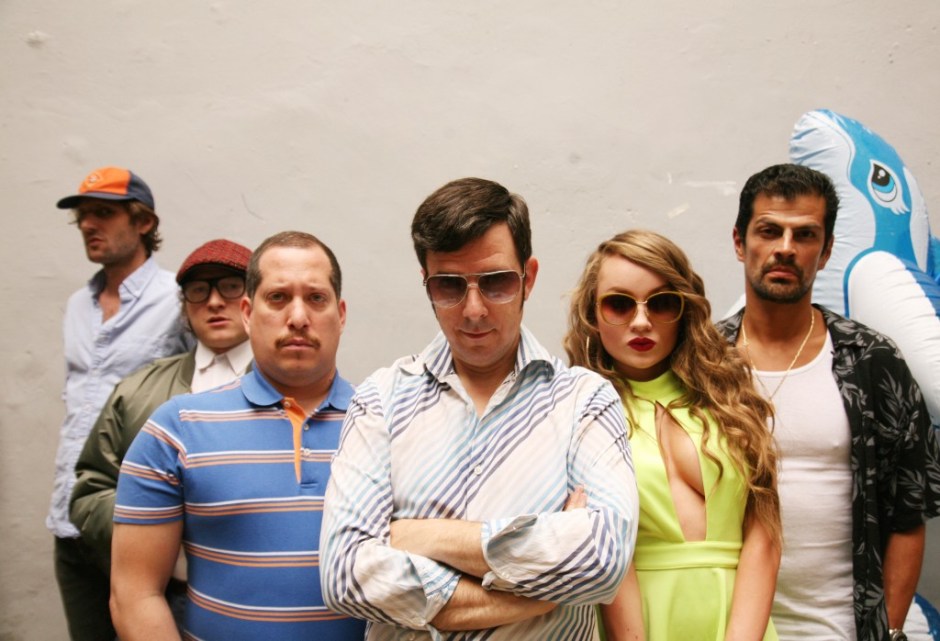Alias Ellis Mackenzie at the Philly Fringe

Alias Ellis Mackenzie was one of the shows I was most looking forward to this Fringe. I had never seen anything by Thaddeus Phillips and his company Lucidity Suitcase Intercontinental before, but his work has been featured as some of the community’s favorite Fringe pieces for years. This particular piece–a high-octane 80s-inspired tale of notorious drug smuggler Barry Seal, framed within a Spanish-speaking film shoot and inspired by Phillips’ own experience playing Seal for a telenovela–sounded like the exact injection of ludicrosity I needed.
Alias Ellis Mackenzie had all the signs of a hyperactive, zany, dizzying experience. Barry Seal’s story is insane, stranger than fiction and bursting with rich detail. The actors–a mix of Columbian soap opera stars and Spanish-speaking local favorites–seemed to be enjoying themselves enormously onstage. The set, engulfed in the massive main stage of the Prince Music Theatre, walked that campy line of extremely expensive materials comprising seemingly low-budget set pieces. The subtitles projected on either side of the stage, skewed away from the action, allowed the audience to access the jokes within the flurry of Spanish invective, albeit a few ticks ahead or behind the words themselves.
But in spite of all of the fun being telegraphed to me, in spite of being able to see the jokes as clearly as if they’d been indicated with neon red arrows, Alias Ellis Mackenzie was stiflingly unfunny. In the entire 105 minutes, our audience laughed maybe twice. Just like Jeremy Barker felt when he saw Red-Eye to Havre de Grace in 2012, I found my first Thaddeus Phillips experience to be “shallow and vapid… a company with a lot of theatrical talent but nothing whatsoever to say through their practice.” It’s difficult for me to definitively put my finger on what really rang hollowly to me about Alias Ellis Mackenzie. Everything was laid out for me to like it: there was local pride, there was camp, there were some really talented people up on that stage. Ultimately I think that, just as Barker did two years ago, I found I could not invest myself in the story Phillips was telling, a story of macho men and shrieking women amid constant, grating 80s music.
Why should I care about Barry Seal? From what I’ve seen in this piece, he’s just a campier version of the antihero trope, a drawling and loveable loose cannon Mary Sue who don’t give a damn ‘bout nobody but himself. Is his tale supposed to connect to today’s drug war, shed light on our contemporary interactions with South America? And why is it important for this story to be told as something actively constructed? True, the scenes between “shootings” contained some of the evening’s most exciting moments of theatre, flurries of action layering across the depth of the stage. But the piece’s emulation of TV’s shooting structure–the scenes out of order, meant to be pieced together in retrospect–made the already jumbled story nearly impossible to follow. What’s more, the breaks in the action sank the momentum, giving the audience too much time to puzzle over the plot holes and problems. What do we gain from couching this story in artificiality? Are we not supposed to take any of this seriously? If so, why bother presenting this to us at all?
The most I can say I gathered from Alias Ellis Mackenzie is that an audience can make or break a performance. I’m entirely willing to believe that under the right circumstances, this show is funny. It certainly has the trappings of a zany, energetic romp. But for whatever reason, what Mackenzie offered to us that night, we did not take. And once we didn’t take it, Mackenzie’s offering became less and less enthusiastic. We dovetailed together, feeding off each other’s increasingly resentful energy. The final moments of the play I waited with baited breath, praying that we were about to be released. The resulting applause was less a celebration and more a sign of relief. I thanked the actors politely for their time and effort–after all, the piece demanded incredible energy, it would be hard even on the best nights–and got the hell out of there.

One thought on “Alias Ellis Mackenzie at the Philly Fringe”